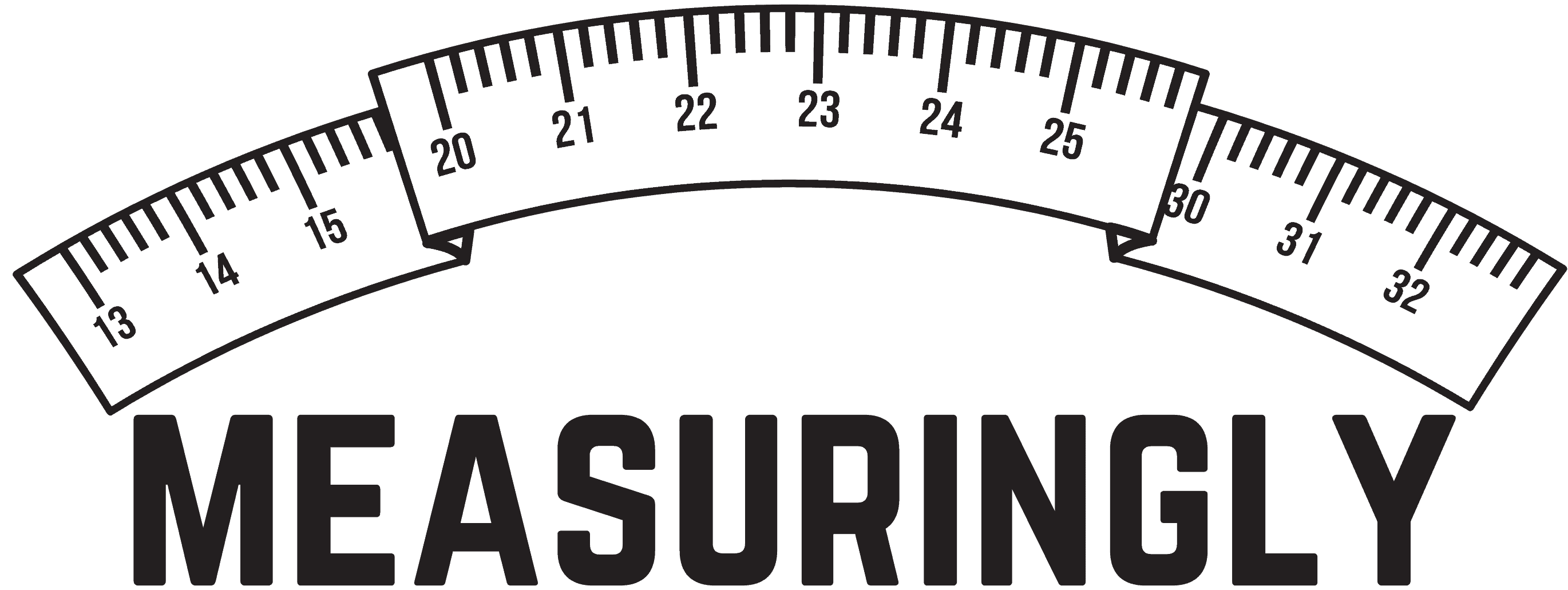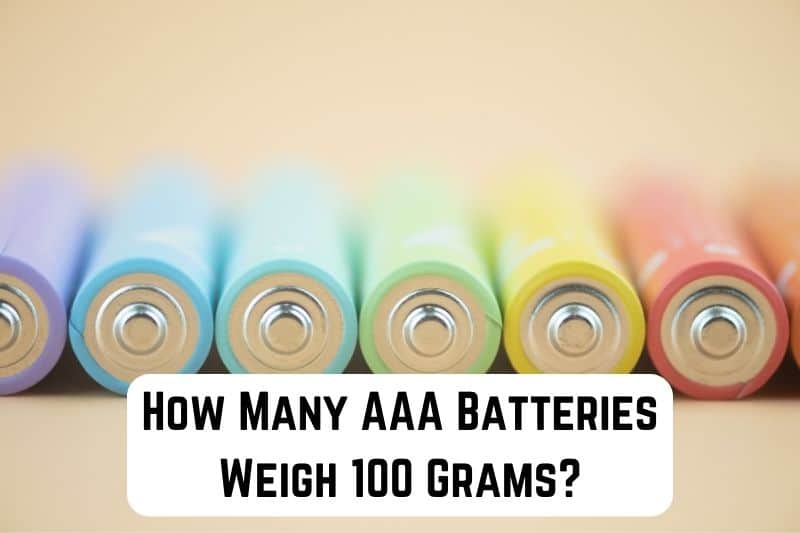Have you ever wondered how many AAA Batteries it takes to reach a weight of 100 grams? Whether it’s for a specific project or simple curiosity, knowing the approximate weight of a specific number of batteries can be quite useful.
To determine how many AAA batteries it takes to reach 100 grams, you’ll first need to understand the average weight of a single AAA battery. An Alkaline AAA battery typically weighs around 11.5 grams, while a rechargeable one is slightly heavier at approximately 14 grams.
Read: How Much Do Ants Weigh? (Worker, Queen & Male Ants)
On average, a single AAA battery weighs approximately 11.5 grams (0.4 ounces). Using the average weight of 11.5 grams, you would need approximately 9 AAA batteries to reach 100 grams in total weight.
Measuringly.com
Understanding the Concept of Battery Weight
When you think about batteries, specifically AAA batteries, it’s normal to wonder about their weight. In this section, you will get to know the general weight of an AAA battery and how many of them weigh 100 grams.
AAA batteries are small and lightweight, making them ideal for powering various portable electronic devices. On average, a single AAA battery weighs approximately 11.5 grams. However, the weight of the battery might vary slightly depending on the brand and the materials used in its construction.
How Many AAA Batteries Weigh 100 Grams?
To find out how many AAA batteries would weigh 100 grams, you can divide 100 by the approximate weight of one AAA battery. Using the average weight of 11.5 grams:
100 grams ÷ 11.5 grams/battery ≈ 8.7 batteries
Based on this calculation, you would need approximately 9 AAA batteries to reach 100 grams in total weight.
Remember that this is a rough estimate, and the actual number might differ based on the individual weight of each battery.
It’s always helpful to understand the weight of the batteries you’re using, as it can impact your devices’ overall performance and convenience. Knowing the weight of AAA batteries and their total weight in various quantities is useful when comparing them to other battery sizes and types.
There are different types of AAA batteries available on the market, such as alkaline, lithium, and rechargeable nickel-metal hydride (NiMH), each with their own typical weight range:
- Alkaline: Usually around 11.5 grams (0.4 ounces)
- Lithium: Slightly lighter at approximately 7.6 grams (0.27 ounces)
- NiMH rechargeable: Could weigh around 14 grams (0.49 ounces)
Now that you have an idea of how many different types of AAA batteries Weigh, you can better estimate how many you would need to reach a specific weight. For instance, if you need 100 grams of AAA batteries, here’s an estimate for each type:
- Alkaline: ~9 batteries (roughly 103.5 grams)
- Lithium: ~13 batteries (about 98.8 grams)
- NiMH rechargeable: ~7 batteries (approximately 98 grams)
Dimensions of a AAA Battery
When you hold a AAA battery in your hand, you might wonder about its dimensions and how it compares to other battery sizes. AAA batteries are cylindrical in shape and smaller than the commonly used AA batteries. To give you a better understanding, let’s explore the dimensions of a standard AAA battery.

AAA Battery Dimensions
A typical AAA battery has a diameter of around 10.5 millimeters (0.41 inches) and a length of 44.5 millimeters (1.75 inches). These dimensions make it quite convenient for use in small electronic devices like remote controls, flashlights, and toys. The small size helps manufacturers design compact and portable products.
AAA Battery Weight
In terms of weight, a single AAA battery usually weighs around 11.5 grams (0.4 ounces). This weight can vary slightly depending on the type of chemical composition inside the battery, such as alkaline, zinc-carbon, or lithium. However, the minimal variance shouldn’t impact your device’s performance.
How Many Lithium AAA Batteries Make 100 Grams?
When you’re trying to calculate the number of AAA batteries required to reach a combined total of 100 grams, you’ll first need to consider the weight of an individual battery.
The weight of AAA batteries can vary slightly depending on the brand and type. Still, generally speaking, you can expect the weight of an average alkaline AAA battery to be around 11.5 grams.
Now, to determine the number needed to reach 100 grams, you can do a simple calculation. You’ll start by dividing the target weight (100 grams) by the weight of a single AAA battery (11.5 grams):
100 grams ÷ 11.5 grams = 8.7 (rounded to the nearest decimal)
Since you cannot have a fraction of a battery, you will need 9 AAA batteries to surpass the 100-gram mark slightly.
If you use a different type of AAA battery, such as a lithium AAA battery, the weight may vary from that of the more common alkaline type. A lithium AAA battery typically weighs slightly less, at around 7.6 grams. If you are using lithium AAA batteries, the calculation would be as follows:
100 grams ÷ 7.6 grams = 13.15 (rounded to the nearest decimal)
In this situation, you would require 14 lithium AAA batteries to reach over 100 grams.

Factors Affecting Battery Weight
When you’re trying to calculate the number of AAA batteries required to reach a combined total of 100 grams, you’ll first need to consider the weight of an individual battery. The weight of AAA batteries can vary slightly depending on the brand and type.
Still, generally speaking, you can expect the weight of an average alkaline AAA battery to be around 11.5 grams. Here are some factors that can affect the weight of AAA batteries:
- Battery chemistry: AAA batteries are available in different chemistries, such as alkaline, lithium, and nickel-metal hydride (NiMH). Each of these chemistries has a different weight. AAA alkaline batteries usually weigh between 11-12 grams each, while AAA lithium batteries are a bit lighter, typically weighing around 7.6 grams each. AAA NiMH batteries have a weight that falls between Alkaline and lithium, around 10 grams each.
- Manufacturer: Different manufacturers may use slightly different materials, affecting the overall weight. Different models within the same brand may also have some variation in weight.
- Quality and thickness of components: The quality and thickness of the battery components can also influence the weight. A battery made from high-quality materials with a sturdier construction might weigh slightly more than a lower-quality equivalent. Additionally, the thickness of the casing and the battery components can also impact the overall weight.
Now, to determine how many AAA batteries weigh 100 grams, you can do a simple calculation. You’ll start by dividing the target weight (100 grams) by the weight of a single AAA battery (11.5 grams):
- 100 grams ÷ 11.5 grams = 8.7 (rounded to the nearest decimal)
Since you cannot have a fraction of a battery, you will need 9 AAA batteries to surpass the 100-gram mark slightly.
If you use a different type of AAA battery, such as a lithium AAA battery, the weight may vary from that of the more common alkaline type. A lithium AAA battery typically weighs slightly less, at around 7.6 grams.
If you are using lithium AAA batteries, the calculation would be as follows:
- 100 grams ÷ 7.6 grams = 13.15 (rounded to the nearest decimal)
In this situation, you would require 14 lithium AAA batteries to reach over 100 grams.
Using a Scale to Measure Battery Weight
If you want to determine how many AAA batteries Weigh 100 grams, a simple method to follow is using a scale to measure battery Weight. Here are the steps to follow:
- Make sure you have a digital scale that accurately measures in grams.
- Place a few AAA batteries on the scale gently, so as not to damage the batteries or the scale.
- Keep an eye on the scale, watching the weight displayed as you add each battery.
- It’s a good idea to have a pen and paper handy to jot down how much each battery weighs, as this can give an idea of the average weight per battery. AAA batteries generally weigh between 11 and 15 grams each, depending on their type, material composition, and brand.
Based on this information, you can estimate how many AAA batteries are needed to reach 100 grams. For example:
- If your batteries weigh on average 11 grams, divide 100 by 11 to get approximately 9.09 (rounding up to 10 batteries)
- If they weigh 15 grams, divide 100 by 15 to get 6.67 (rounding up to 7 batteries)
To make your experiment more accurate, you can follow these tips:
- Use a larger sample of batteries for better accuracy
- Weigh batches of 5 or 10 batteries to reduce the impact of any small measurement errors
- Use batteries from the same brand and type to ensure uniformity
- Make sure your scale is properly calibrated for the most accurate results
By taking these steps, you’ll be able to confidently determine how many AAA batteries it takes to reach a weight of 100 grams.
Read: How Much Does a Rabbit Weigh? Quick Facts and Figures
Weight of Other Batteries
While you explore the world of batteries, particularly AAA batteries, knowing the weight of other types can also be helpful. Let’s discuss a few common battery types so you can have a general idea of their respective weights.

AA batteries are the bigger siblings of AAA. You’ll find them often in remote controls and toys. A typical AA alkaline battery weighs around 23 grams. However, a lithium AA battery is slightly lighter, weighing close to 15 grams.
C batteries, also known as R14, are larger than AA batteries and are often found in high-drain electronic devices, flashlights, and portable radios. A C Alkaline battery typically weighs around 66 grams, while a C zinc-carbon battery weighs approximately 62 grams.
D batteries, or R20, are the largest cylindrical batteries commonly in use. They’re designed for devices that require a lot of power, like boomboxes and large flashlights. A D alkaline battery weighs around 135 grams, and a D zinc-carbon battery weighs about 127 grams.
9V batteries, also called PP3 or 6LR61, are rectangular, smaller than cylindrical batteries, and usually used in smoke alarms and certain remote controls. A 9V Alkaline battery weighs approximately 45 grams, while a 9V carbon-zinc battery weighs around 39 grams.
Remember, the exact weight of a battery may vary depending on its composition and specific brand. If you need to know the weight of a specific battery, it’s always a good idea to check the manufacturer’s specifications.







